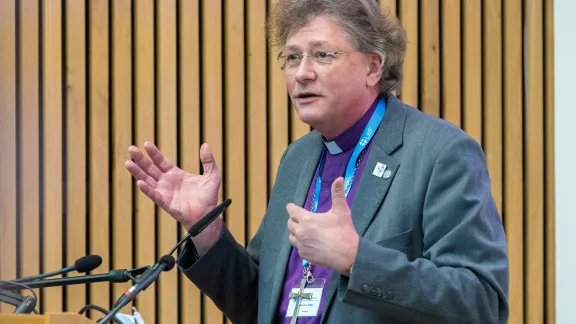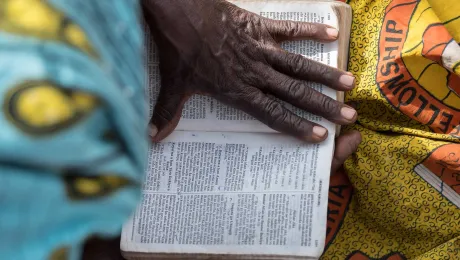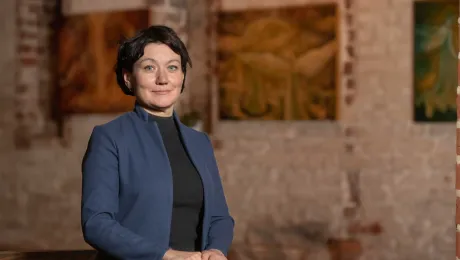
Rev. Dr Andreas Wöhle, President of the Lutheran Synod of the Protestant Church in the Netherlands. Photo: LWF/Albin Hillert
Jazz musician, martial arts practitioner, pastor and Synod President, Andreas Wöhle encourages parishioners to find spirituality in unexpected places
(LWI) - From cooking courses to jazz music and Japanese martial arts, Rev. Dr Andreas Wöhle believes that spirituality can be discovered and experienced in a wide variety of unexpected ways. He currently serves as President of the Lutheran Synod of the Protestant Church in the Netherlands, which was established in 2004 when Lutherans united with the majority Reformed Churches of the Netherlands.
At the same time, the German-born Wöhle is part-time pastor to the largest parish in Amsterdam and chair of an initiative to promote interfaith learning and understanding. He previously worked as Regional Secretary for Europe with the Lutheran World Federation (LWF) and continued serving as a member of its task force on Jewish-Lutheran dialogue.
He shares reflections about the church he leads, about his own journey to ministry and the many, varied ways in which he seeks to communicate his passions for “food, music and all the beautiful things of life.”
Tell us something about the Lutheran church in the Netherlands?
We have been here since the 16th century, but as a smaller community alongside two very strong Reformed churches. In 2004, when we became united, we were about 10 or 11,000 Lutherans out of 2.1 million members. Now that number is down to around 1.48 million, and we Lutherans are down to some 6 or 7 thousand within just 20 years.
As the smaller partner in this relationship, we try to share everything that is joyful about Lutheranism. I like to say that the Reformed tradition is more rectangular, whereas we are more rounded, so we are into enjoying life and food and music and all those beautiful things. When people say there is only a small Lutheran presence, we turn it around and say we are small groups where people get to know each other and really form communities which are welcoming and open to many different forms of spirituality.
Is that a successful model in a secular society like the Netherlands today?
Let’s say the challenge is that we have a spiritual “product” which people will like, but how do we get them to taste it and see? That is complicated in a situation where several generations have been brought up with the idea that the church is oppressive and moralistic and not for intelligent people. We need to reach out to the new generation who actually don’t think anything at all about the church, because to them it is as exotic and unknown as the Buddhist temple or Hindu rituals, so we have to introduce them to what we know to be the nice flavors and traditions of Lutheranism.
But are we successful in our missionary strategy? No we are not, we are still getting smaller. But we also notice that as communities get smaller, they develop a stronger cohesion and sometimes it’s enough for one or two new people to join each year to remain stable. So, I think we are about being small and beautiful and present.
Tell us about yourself – do you come from a traditionally religious family?
No, totally not. Like many average German families, we went to church only at Easter and Christmas. My father was a teacher and my mother was a bookkeeper, and I grew up in a ‘not interested, but not negative’ setting. Then I was sent to catechism classes because that was what everyone did as part of the dominant culture, and I had the good luck of finding an enthusiastic, warm-hearted pastor in a place where all the questions I had as a teenager found open ears and were welcomed and taken seriously.
So, from the age of 14, I knew that this was the place I wanted to work and live. Actually, I first wanted to be an airline pilot but I wear glasses so that was a no-go. Then I wanted to become a lawyer or a social worker, but when I discovered that I could work for justice, peace and the formation of young people within the church, I decided I will become a pastor and I have never regretted that decision.
You started studying theology in Germany and then moved to the Netherlands for your PhD and ordination, but at the same time, you’ve also always been interested in music, haven’t you?
Yes, like most young people I started with the guitar which you can take to play around the campfire and impress others. But more seriously, yes, I love to sing and this is an important part of my spirituality, being able to use my body to make music.
Then I went through the clarinet to the saxophone and found jazz as a way of expressing myself. Jazz is my way of doing theology and doing parish work and I am fortunate to have found a parish which not only tolerates this, but to a certain degree enjoys it too – as long as I stay on a more or less recognizable mainstream path. I am also part of the Blue Church, which is a thriving jazz network, mainly in Europe, that connects people doing music, exploring the boundaries between religious, secular and jazz music in a church setting.
Tell us something about your parish work?
It's the largest parish in the Netherlands, so about 2,000 people, but I am not responsible for all of them. Our structure is that whoever becomes president of the Synod (the equivalent of bishop in other churches) gets another pastor to come and take over a third of their pastoral responsibilities. But I have been a pastor in this parish for about 15 years and I wouldn’t want it any other way. Being a parish pastor was something I missed when I worked in Geneva because this is where the church becomes personal, through marriages and funerals and peoples’ everyday challenges.
You have also introduced cookery classes to your parishioners, haven’t you?
Yes, although I haven’t always been good at cooking, in fact my children tell me that when they were young, I always used to overcook and burn things. But here in Amsterdam, I live next to the main market which has a beautiful fish market and so I specialized in that field of cooking. I am very interested in tasting and to begin with, I thought that everyone tastes in the same way. But when I started doing whiskey tasting as one of my hobbies, I realized that I seem to have a special gift in tasting.
So I started some tasting sessions for people in the parish and I found that beauty and taste and holiness, these three dimensions somehow touch each other. Here in the Netherlands, to a certain degree, I think we have lost the ability to talk about holiness, about what it is that makes our life different from just eating and working. So, I turned this around and thought, okay, if people can learn to talk about food and drink in a way that goes beyond their normal daily lives, then I can use this language as a kind of spiritual communication.
I started cooking courses, preparing some small dishes where people could not see from the outside what they were made of. For example, if you make a foam from tomato juice, it is white, but it is still full of the flavor of tomatoes. So, people have to describe what is happening in their mouths, which helps them to sharpen their senses and their language. Then, because we are in a church setting, I ask, “Well, what does grace taste like? Or sin, for example?”
One person would say, “sin is hot and leaves a burning in my mouth,” but another would say, “no, it’s sweet and delicious and seductive,” so suddenly we are talking about these two aspects of sin. I call these courses ‘Cooking Grace’ and they really work because the best part is that everyone loves good food and good company and talking about what it means to them.
Another of your hobbies is Japanese martials arts – where does this passion come from?
Well, I’ve been practicing judo since I was 10 but then, at a certain point, my knees were not so good anymore and I began looking for something that I could continue to practice as I get older. So I found Shinkendo, which is a newer martial art developed from the old Samurai techniques of sword fighting. It’s about physical concentration, informed by the moving of the sword, losing track of time by being all-present in the moment.
That, for me, is also one of the elements of good church worship. When it is good, you enter this realm of holiness where you feel you are part of this beautiful thing and time doesn’t play a role. When a service is bad, on the other hand, you look at your watch all the time. This is what Shinkendo does for me. It creates a meta time where you are out of time, yet still in the present. Then there is the spirituality of the sword, the sword of the spirit as Saint Paul calls it, which helps you see when you are out of balance and therefore off target. So Shinkendo is an important part of my spiritual life and feeds into my work as a pastor.
On a broader, communion-wide level, you were also a member of LWF’s task force on Jewish-Lutheran relations – how important is the work of interfaith dialogue for you?
I would say that it is a part of my self-understanding, rooted in my being German and all the devastating history that our nation has caused and continues to confront. There is a second element which relates to when I was young and, as well as doing judo, I was a high jumper in the German national athletics team. We had a competition with the Maccabi Athletics Club in Tel Aviv in the early 70s: I will never forget the day we were on a bus and next to me there was an old person holding onto the central pole to stop himself from sliding around. And I saw this mark, his [concentration camp] number on his arm. Even though this was over 50 years ago, it has made me realize how important historical awareness and dialogue are, both at a theological and at a personal level.
This is something I do in the Netherlands as chairperson of an activity called the Weekend for Celebration and Learning, where we bring together Christians and Jews for a whole weekend, starting with a Shabbat service on Friday and ending with Sunday morning worship. We talk about all the things that touch our lives, from anti-Semitic experiences to favorite foods and our dreams for our children. We share how faith perspectives and traditions play a role in all of that. The advantage of the weekend format is that when things get complicated, people may stop talking to each other, but then they cannot evade each other and meet again over breakfast the next morning. This can strengthen relationships, creating new ways of learning and doing theology.
I imagine the experience of visiting Auschwitz during the LWF Assembly in Kraków was a particularly poignant moment for you?
Yes, it was, and I was proud that we, as a communion, dared to make this visit with all of the participants, knowing that it will not be the same experience for people coming from very different parts of the globe. For some, perhaps, it was just another part of the Assembly, but for me, it was a crucial experience.
The focus of that Assembly and of the new LWF Strategy is on hope – what does hope mean for you, in your context?
Hope is what creates the space where we can meet each other as human beings. In our contemporary societies, we tend to withdraw into pockets where we don’t meet people who think differently from ourselves. Hope helps me realize that there is more to that person than I may see at first sight, and it gives me the energy to get together with that person. The church must be such a space, where we can hope for more than we would ordinarily expect, to be a fountain of hope and a counter force to what is happening in our societies now.


